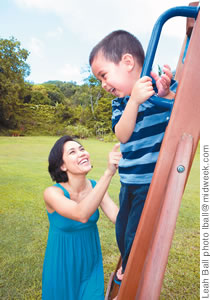Taking A Walk For Autism Research

Friday - June 11, 2008
| Share
 Del.icio.us
Del.icio.us
|
Emi Hart has been busy rounding up her family and friends for the Walk Now for Autism June 14 at 8:30 a.m. at Ala Moana Beach Park.
“My family has experienced the effects of autism on a personal level as my son Aidan is on the autism spectrum,” says Hart, who founded Fashionista’s Market with sister Alyssa Fung. “The walk is one way for us to support Aidan, to raise money for autism research and to raise awareness about it. It’s just scary to think how many kids have autism now. I just want somebody to read this and realize that the earlier you catch it, the better.”
Autism Speaks defines autism as a complex brain disorder that inhibits a person’s ability to communicate and develop social relationships and is often accompanied by extreme behavioral challenges. Autism spectrum disorders are diagnosed in 1 in 150 children in the United States, affecting four times as many boys as girls.
The Centers for Disease Control and Prevention has called it a national public health crisis whose cause and cure remain unknown. Autism is, however, treatable.
According to the Autism Society of America, children do not outgrow autism, but studies show that early diagnosis and intervention can lead to significantly improved outcomes.
That’s why it is crucial to know the signs. The National Center on Birth Defect and Developmental Disabilities lists those signs as:
* Lack of interest in playing “pretend” games
* Not pointing at objects to show interest (for example, pointing at an airplane flying over)
* Not looking at objects when another person points at them
* Trouble relating to others or lack of interest in other people at all
* Avoiding eye contact and wanting to be alone
* Trouble understanding other people’s feelings or talking about their own feelings
* Prefers to not be held or cuddled or might cuddle only when they want to
* Appears to be unaware when other people talk to them but respond to other sounds
* Is very interested in people, but does not know how to talk, play or relate to them
* Repeats or echoes words or phrases said to them, or repeats words or phrases in place of normal language
* Have trouble expressing their needs using typical words or motions.
* Repetitive actions (such as hand-flapping, twirling objects)
* Has trouble adapting when a routine changes
* Reacts unusually to the way things smell, taste, look, feel or sound
* Loses skills they once had (for example: stops saying words they were once using)
“When we look back at it, it was so obvious,” says Hart. “He would just stare off into the distance. He wasn’t making eye contact. He wasn’t engaging. That was the real telltale sign, that you’re trying to make a connection with him and he wasn’t there.
“But we didn’t really get it. I remember thinking it’s our first baby, we’re just being paranoid.”
But when Aidan was still not talking at about 2 years old (he’s 4 now), Emi and husband Joe knew something was wrong.
Soon after, a behavioral therapist diagnosed him with the autism spectrum disorder.
“(Since the diagnosis) it’s made me restructure my way of thinking,” says Hart, who also has a 2-year-old daughter Mimi. “As parents, I think we have so many expectations for our children even before they’re born. Now, I know that the important thing is not the things they accomplish, but just them being happy with who they are.”
For more information on Saturday’s walk, visit www.walknowforautism.org.
E-mail this story | Print this page | Comments (0) | Archive | RSS Comments (0) |
Most Recent Comment(s):













